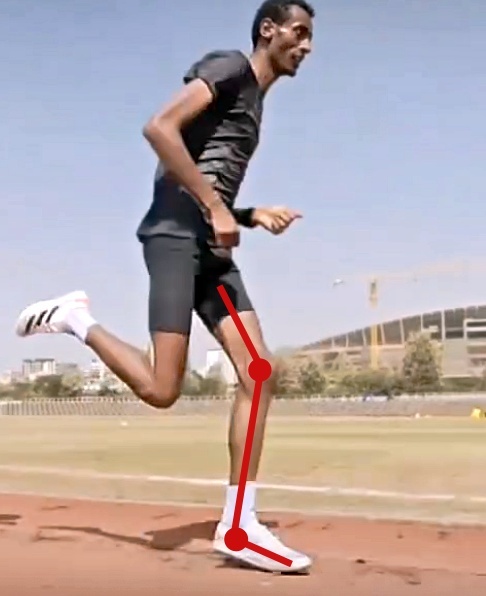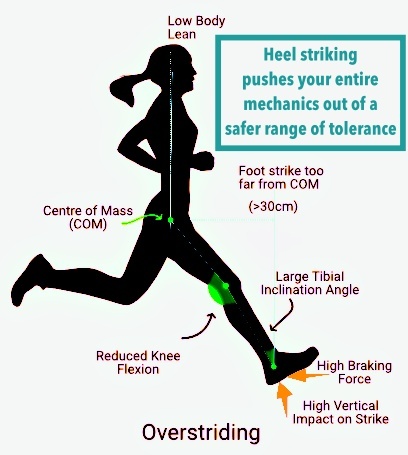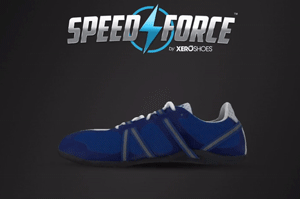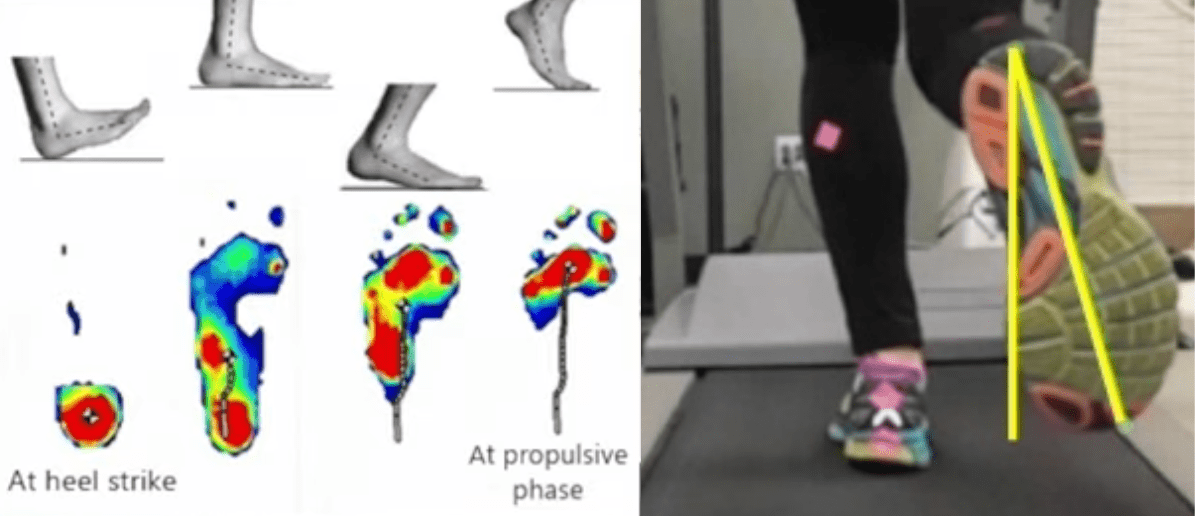Heel striking when running has demonstrated a track record of causing all types of Achilles injuries because the heel-to-toe movement path of the foot that occurs after heel strike causes the foot to shift abruptly into extreme positions, even in a motion-control stability running shoe.

In a study published in Clinical Sports Medicine discovered that heel striking when running caused a heel whipping motion which altered ankle moments that caused Achilles injury.
Other studies (references below article) have found another way heel striking causes Achilles tendon injury: Landing heel-first was found to overwork the hips through all phases of gait, namely the propulsive phase, which put additional strain on the Achilles. This is because heel striking caused the hips to be used too much to make the foot aggressively push the entire weight of the body forward through each step. This excessive push-off from the foot was found to over-strain the Achilles.
The researchers also believe that this mechanical load causes the ankles to pick up the slack for when the hips fatigue (from being overworked), which could put additional stress on the Achilles, too.
This is why switching from heel strike to forefoot strike running should be of interest because forefoot striking engages the hips in a different, more functional manner.

Of significance, landing forefoot-first was found to bend the knee slightly at landing, while causing the torso to tilt slightly forward (shown below). This mechanical arrangement has the hallmark effect of creating a free-fall, where the body is better able to continuously fall forward, which was found to reduce work-loads off the hip, while less muscle effort is needed from the foot and the leg to propel the body forward.


All these key stride parameters are engaged by running with a forefoot strike, but are impeded, and reversed for the worst when a heel strike landing is used:

The list of things that can go wrong with heel strike running outweighs to that of forefoot running. Forefoot running produces more forward thrust with less muscular effort from the foot and hips. This key difference helps safeguard the Achilles from injury, while resulting in a larger surface area to contact the ground of which impact is able to spread over a larger area of the foot, which was found to do a better job at protecting the foot from injury than heel strike running.

In fact, here are well-over 30 evidence-backed reasons heel strike running is the most damaging and inefficient way to run, whereas forefoot running perfectly prevents all the injuries caused by heel strike running!
If you’ve enjoyed this video, you’ll love my YouTube channel, here, where I show why and how forefoot running works!
References:
[1]. Smith et al. Neuromotor control of gluteal muscles in runners with Achilles tendinopathy. Med Sci Sport Exerc, 2014;46(3):594-599.
[2]. Kahn et al. The painful nonruptured tendon: clinical aspects. Clin Sports Med, 2003 (22):711-725.

If you’d like, you can support Run Forefoot and help keep it going by making a donation in any amount of your choosing:

Or, you can support Run Forefoot by shopping at the BEST Barefoot Shoe Brands, and be sure to bookmark these links 🙂
Lonowear: https://lonowear.com/?ref=cedsholh
Saguaro: https://www.saguaro.com/?ref=9bVA8fEkmDvB-I
Vibram FiveFingers: https://www.anrdoezrs.net/click-7600968-11372648
Vivobarefoot: https://amzn.to/3vycQOY
Be Lenka: https://www.tkqlhce.com/click-7600968-13947200
Xero Shoes: https://xeroshoes.com/go/Run_Forefoot
Iguaneye: https://www.iguaneye.com/?ref=8tfXVc92
Soft Star Shoes: https://shrsl.com/3mp1b
Wilding Shoes: https://bit.ly/3lIygQP
Bretta Riches
BSc Neurobiology; MSc Biomechanics candidate, ultra minimalist runner & founder of RunForefoot. I was a heel striker, always injured. I was inspired by the great Tirunesh Dibaba to try forefoot running. Now, I'm injury free. This is why I launched Run Forefoot, to advocate the health & performance benefits of forefoot running and to raise awareness on the dangers of heel striking, because the world needs to know.
Latest posts by Bretta Riches (see all)
- Can You Run In Barefoot Shoes? Yes, But DON’T Heel Strike! - 21/07/2024
- Why Cushioned Running Shoes Are Really Bad for Your Feet - 19/07/2024
- Do Cushioned Running Shoes Cause Injuries? - 17/07/2024

